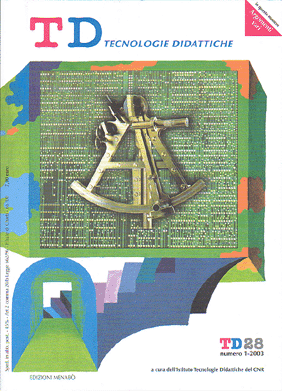Navigare nel WWW a scuola: ma per andare dove?
Contenuto principale dell'articolo
Abstract
Dettagli dell'articolo
Sezione
Gli autori che pubblicano su questa rivista accettano le seguenti condizioni:
- Gli autori mantengono i diritti sulla loro opera e cedono alla rivista il diritto di prima pubblicazione dell'opera, contemporaneamente licenziata sotto una Licenza Creative Commons CC BY 4.0 Attribution 4.0 International License.
- Gli autori possono aderire ad altri accordi di licenza non esclusiva per la distribuzione della versione dell'opera pubblicata (es. depositarla in un archivio istituzionale o pubblicarla in una monografia), a patto di indicare che la prima pubblicazione è avvenuta su questa rivista.
- Gli autori possono diffondere la loro opera online (es. in repository istituzionali o nel loro sito web) prima e durante il processo di submission, poiché può portare a scambi produttivi e aumentare le citazioni dell'opera pubblicata (Vedi The effect of Open Access).
Riferimenti bibliografici
Burbules N. C. (1997), Aporia: Webs, Passages, Getting Lost, and Learning to Go On, Philosophy of Education YearBook 97 http://www.ed.uiuc.edu/EPS/PESyearbook/ 97_docs/burbules.html
Caviglia F. (2002), Lie Detecting as a Step Towards Critical Literacy, L1- Educational Studies in Language and Literature Vol. 2, n. 3, 179- 220.
Chapman D. W. (1999), A Luddite in Cyberland, Or How to Avoid Being Snared by the Web, Computers and Composition n.16, 247- 252.
Cunningham D.J., Arici A., Schreiber J., Lee K. (2001), Navigating the Wirld Wide Web: the role of abductive reasoning, CRLT Technical Report n. 19-01, Indiana University.
Dodge B. (1997), Some Thoughts About WebQuests, e-paper http:// edweb.sdsu.edu /courses/edtec596/ about_webquests.html
Eisenberg M.B., Johnson D. (2002), The Big6 Learning and Teaching Information Technology Computer Skills in Context, Eric Digest, EDOIR- 2002-04.
Gadamer H.G. (1983), Verità e Metodo, Bompiani.
Hölscher C., Strube G. (2000), Web search behavior of Internet experts and newbies Computer Networks 33, 337–346.
Jakes D. S., Pennington M. E., Knodle H. A. (2002), Using Internet to promote inquiry based learning, e-paper http://www.biopoint.com /inquiry/ibr.html
Janssen T. (2001), Self-questioning in the literature classroom: a review of research. Graduate Institute of Teaching and Learning, University of Amsterdam.
Lazonder A. W. (2001), Minimalist Instruction for Learning to Search the World Wide Web, Education and Information Technologies 6:3, 161- 176.
Lucca G. (2003), Didattica Del Latino e Strumenti Informatici , Atti di Didamatica 2003, in stampa.
McKenzie B.(1998), Grazing the net, Now On The Educational Technology Journal http://www.fno. org/text/grazing.html
Navarro-Prieto R, Scaife M., Rogers Y, (1999), Cognitive Strategies In Web Searching, Proceedings V Conference on Human Factors& the Web http://zing.ncsl.nist.gov/hfweb/p roceedings/ navarro-prieto/
Petrucco C. (2001), Costruire mappe per cercare in rete: il metodo Sewcom in TD n. 1, pp 37-48.
Salomon G. (1998), Novel Constructivistic learning environment and novel technologies: some issues to be concerned with Research Dialogue in Learning and Instruction Vol 1 n. 1 pp 3-12.
Novel Suarez, J., Martin A. (2001), Internet Plagiarism: A teacher’s combat guide. Contemporary Issues in Technology and Teacher Education, Online Serial http://www.citejournal.org/vol1/ iss4/currentpractice/article2.htm
Van der Meij H. (1994), Student questioning: a componential analysis. Learning and individual Differences 6(2) 137-161.
Weinrich H. (1985), Vie della Cultura Linguistica, Il Mulino.
Weintgartner C. Postman N. (1975), L’insegnamento come attività sovversiva, La Nuova Italia.
Wilson B., Lowry M. (2001), Constructivist Learning on the Web, in Liz Burge (Ed.), Learning Technologies: Reflective and Strategic Thinking. Jossey-Bass, San Francisco http://ceo.cudenver.edu/~brent_ wilson/WebLearning.html

